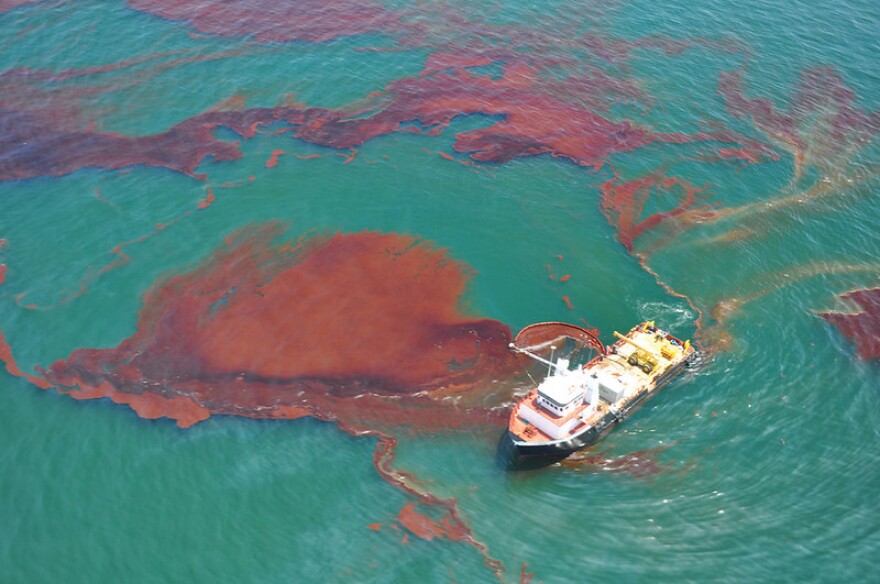The Deepwater Horizon oil spill was an attack on the health of the Gulf and there were many efforts to clean up the damage. But a researcher from UWF says Mother Nature likely did the biggest clean-up job.
At the time of the oil spill, it was estimated that the economic impact of the Gulf of Mexico in the U.S. and Mexico was around $234 billion a year. Despite that, there was a lot about the Gulf that scientists didn’t know.
“Prior to the spill we didn’t know a lot about the Gulf compared to some other major bodies of water in the country. For instance, Chesapeake Bay, a much smaller piece of water, but we knew much more about it, it was much more heavily studied because of where it’s located near Washington, D.C. and Virginia,” said Dr. Wade Jeffrey, a Distinguished University Professor of Biology and Director of the Center for Environmental Diagnostics and Bioremediation at the University of West Florida. “The Gulf of Mexico, while it is a very economically important water mass, was much less well studied, other than people looking for oil and gas. But not so much the biology and some of the fundamental oceanography that needs to go on.”
Dr. Jeffery was among a group of scientists who didn’t think the oil would make it to Pensacola Beach. Then, 10 years ago this month, it happened.
“Totally caught us off guard, we didn’t think it was going to happen. And yet we woke up that morning to find oil all over the beach. But we only had (the oil come in) once, where if you look at the beaches in Mississippi and Louisiana they were coated for (a very) long period of time. In fact, there is still oil residue in some of the marsh lands. The spill happened to the west of us and so it went directly into the shore. Some of it was kept off shore by the current, but it just didn’t come towards us as much as it might have gone on other places. It didn’t go to Texas like people thought it would either. So (the spill focused on) Louisiana and Mississippi, the hardest hits.”
In the 10 years since the spill, the health of the Gulf has steadily improved. Dr. Jeffery says that out of all the remediation efforts at the time, Mother Nature probably did the most good.
“The efforts to scoop it up off the surface of the water, they set it on fire to try to get rid of some of it, they used dispersants to try to break it up into smaller particles to that it would degrade faster. (All those methods) had their effects and they all had their good points and bad points but I think probably the natural ‘attenuation by remediation’ as it’s called by the natural bacterial communities in the Gulf probably did as much to clean it up as anything.”

"One of the things about the Gulf of Mexico too that I should mention is that there (are) thousands of natural ‘oil seeps’ in the Gulf" said Jeffery, "so there’s a lot of oil that comes into the Gulf of Mexico anyway. But it comes in very slowly over a much broader area. It’s not this inundation in a sudden spill. One of the reasons I thought that actually helped us is I think it sort of primes the microbial community to be able to see the oil and start to degrade it. Since the microbes in the Gulf of Mexico see oil all the time it wasn’t a huge shock. I mean as big a shock, it was a huge shock but it wasn’t as bad as it couold have been.”
In the end, Dr. Jeffery thinks the main casualty in the immediate aftermath of the oil spill was the economy. “There were the immediate economic effects, both real and perceived. Fisheries were shut down. A lot of the economic engine that drives the Gulf, tourism all but came to an end. And some of it was because there was oil and there were direct effects, some of it was anticipated effects, so people stayed away. And some of it was just perception that the entire Gulf of Mexico was coated in oil when, in fact, it wasn’t. But the way it was often reported in the news media, you’d have a guy standing there talking about all the oil, and using B-roll film of the marshes of Louisiana when it turns out that he’s actually standing in St. Petersburg, Florida where they wasn’t any oil on the beach. But if you were a tourist and you saw these news reports, you’d think the entire Gulf of Mexico was one big black goo. So certainly the fisheries and tourism took the biggest hit.”
And while those industries have recovered and our beaches are clean, you can still find oil from the Deepwater Horizon spill in to our west.
“The problem is that the oil gets up in the marsh lands and the grasses, and it’s just impossible to get it out. It doesn’t flush easily, it gets mixed down into the sediments and coats everything. Here on the beach it either got washed away, degraded or buried pretty quickly so we didn’t see it. And they came and they cleaned the beach as well. They did scoop up the surface of the beach. My guess is that if you went over there (to the Louisiana marsh lands) you’d find (oil) if you knew where to look. I haven’t done it personally.”
Over the years, The Center for Environmental Diagnostics and Bioremediation at UWF has been awarded hundreds of thousands of dollars to study the biological life cycle of the Gulf of Mexico since the oil spill. Dr. Jeffery says several of his students have based their master’s theses on those studies.




